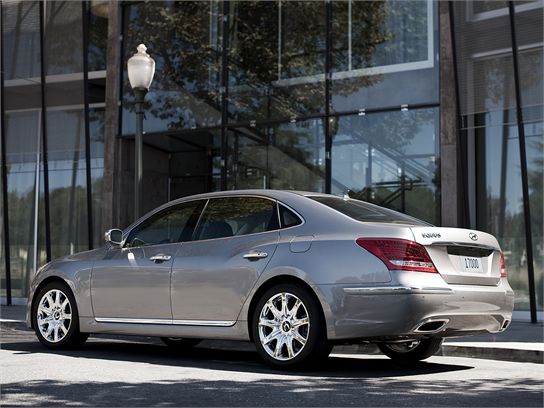Recent Articles
Popular Makes
Body Types
10 Things You Should Know About the 2011 Hyundai Equus
Hyundai Goes High Class
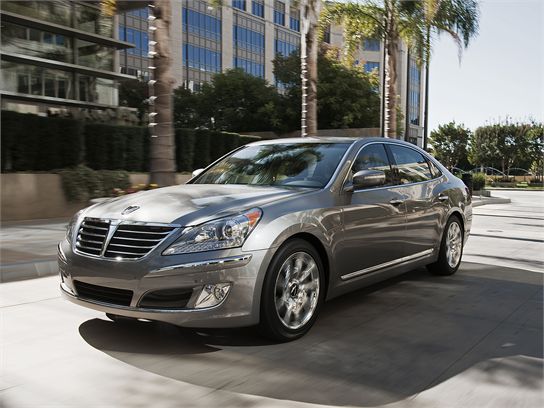
While watching a 24-hour news station recently, we heard a term that was both unfamiliar and unnerving: double-dip recession. A quick Google search led us to an explanation, though not a comforting one. That concept, coupled with rising unemployment and a housing market that's circling the drain, doesn't paint a rosy picture. But it does shine a bright light on the notion of value, a characteristic of the all-new 2011 Hyundai Equus. Though final pricing hasn't been announced, Hyundai reps suggest that the Equus will ring up $10,000-$20,000 below its competitors, while, as we discovered, delivering comparable performance, amenities and appeal. That bleak picture is now starting to take on a little color. The 2011 Hyundai Equus will go on sale through select dealerships starting November 1st.
#10. Hyundai reports prices will start between $55,000 and $70,000.
Hyundai has yet to announce official pricing for the 2011 Equus, though executives did tell us that the starting number will be at least $55,000. That'll get you into the Equus Signature, a model stuffed to the gills with features like soft leather upholstery, a 12-way power adjustable driver's seat with fast and slow massage settings, genuine wood and Alcantara suede trim, a heated steering wheel with Bluetooth controls, intelligent cruise control, and a lane-departure warning system. These items are standard equipment, as are power sunshades, HID headlights, and a navigation system with an eight-inch screen. As if that wasn't enough, the 2011 Hyundai Equus Signature also boasts a 608-watt Lexicon sound system with 17 speakers, USB and auxiliary jacks, a cable to hook up your iPod, and XM satellite radio service.
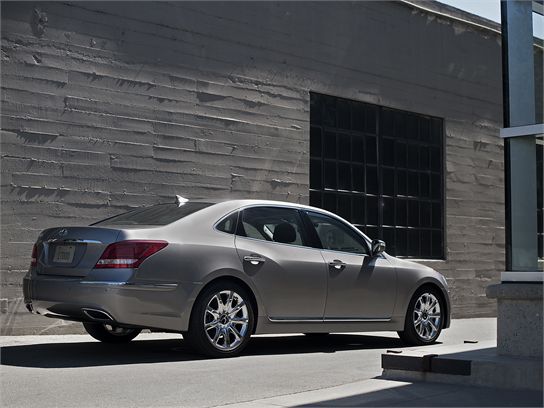
#9. A few special features create the ultimate Equus experience.
Positioned above the Signature is the 2011 Hyundai Equus Ultimate. Again, pricing has not been released, but you can be fairly certain that the window sticker will display a figure greater than $55,000. However, given the bounty of content delivered with the Signature model, you might be wondering what's left to distinguish the Equus's top-of-the-line variant. Quite a bit, actually. The Ultimate takes off from where the Signature stopped, adding a wide-angle front-mounted camera, a power trunk lid, and a rear entertainment system centered on an eight-inch screen. But what really sets the Ultimate apart is its rear-seat configuration. Replacing the standard bench are heated and ventilated buckets, a console with multiple controls and a small cooler, and a powered footrest for the passenger-side occupant.
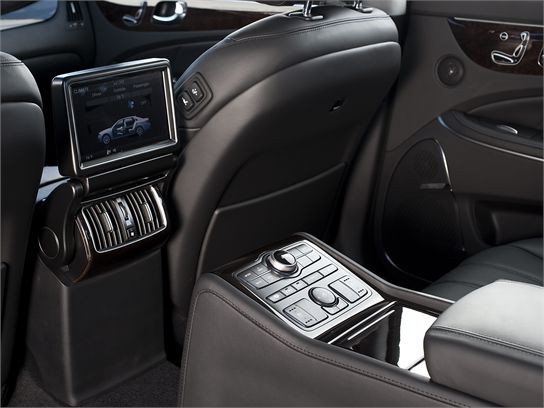
#8. Behind the scenes are a familiar engine and an all-new suspension system.
First introduced to U.S. car shoppers in the Genesis Sedan, Hyundai's 4.6-liter V-8 is the only engine available with the 2011 Equus. Output is rated at 385 horsepower and 333 lb.-ft. of torque when using premium fuel; those figures drop to 378 and 324, respectively, when the tank is filled with regular unleaded. The EPA suggests drivers will record 16 mpg in the city and 24 mpg on the highway. Like its somewhat smaller sibling, the 2011 Hyundai Equus uses a six-speed automatic transmission with a manual shift mode to direct power to the rear wheels. Working in concert with the Equus's powertrain is an electronic air suspension system with continuous damping control, a feature not available on any other Hyundai model. Drivers can select either Normal or Sport mode.
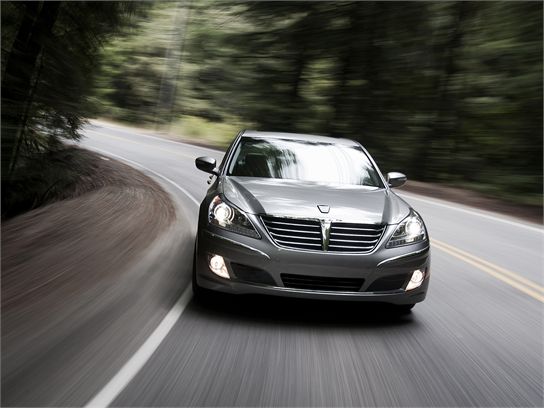
#7. From behind the wheel, the 2011 Hyundai Equus feels smaller than it is.
To the vast majority of us, the recipe for a full-size luxury sedan includes, among other things, a rear-wheel-drive platform and a smooth V-8. The 2011 Hyundai Equus hits the mark on both counts. Under the skin is a modified Genesis chassis, though the air suspension system is all Equus. In Normal mode, we enjoyed a smooth and quiet ride on good roads, but on rough pavement Hyundai's luxurious sedan transmitted too much jounce and felt stiffer than expected. Tap the Sport button next to the shift knob and the steering becomes more responsive and the suspension firmer. When subjected to tight corners at impressive speeds, the 2011 Equus responded with plenty of grip and little body motion. Reaching those speeds was the job of the 4.6-liter V-8, which, in Normal mode, was silky smooth around town and refined when tapped for passing power. We did have to drop the pedal quite a bit to elicit a downshift from the transmission, but we were never left wanting for more ponies. A pop into Sport mode promises quicker response from the gearbox and the throttle, giving the Equus a more sporting feel.
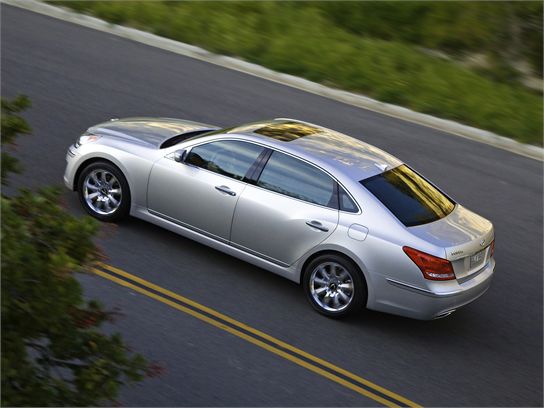
#6. Like any true luxury sedan, the 2011 Equus delivers a generous serving of comfort.
Among the seemingly countless features found on every 2011 Hyundai Equus are those dedicated to comfort. The driver, in particular, benefits from a spacious and well-contoured bucket seat that, along with the heated steering wheel, can be adjusted to accommodate folks of all different sizes. The dual-setting massage is a nice touch, though we actually found it to be distracting. Soft-touch materials on the armrests and sills are provided for all outboard occupants. Move to the second row and you'll find a bench seat in Signature models. Hyundai has provided plenty of foot, leg and head room, as well as supportive cushions and a useful fold-down center armrest. The Equus Ultimate swaps in two inviting buckets and a center console in lieu of the bench. Foot and leg room are not quite as generous as in the Signature model, but, on the plus side, the Ultimate's rear chairs can be heated and cooled.
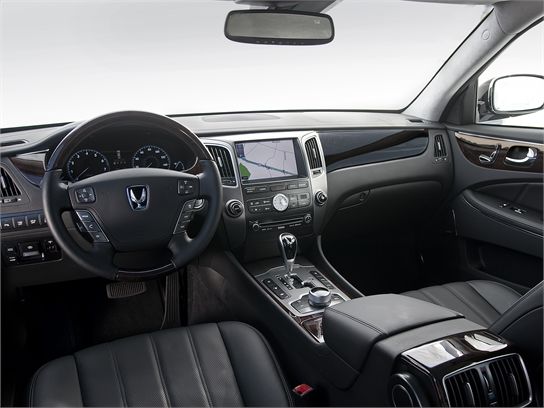
#5. The Equus Ultimate's rear seat is a great idea...for a longer car.
This is something you definitely won't be seeing in the next Elantra or Santa Fe. The 2011 Hyundai Equus Ultimate's rear seat is all about coddling, especially the spot reserved for the passenger-side occupant. That's the place to be if you want access to a multi-function massage feature and a power-adjustable footrest. The former, operated with a hand-held remote, is sure to be a hit with anyone fortunate enough to enjoy it. But the latter has some issues. Using buttons on the rear center console, the front passenger seat is tilted and slid forward, providing room for the footrest to rise. That all works as intended. Unfortunately, a lack of space between the front and rear seats means even passengers of average height will find their feet resting on the backside of the front bucket, rendering the footrest essentially useless and marring a leather seatback in the process. That's not the experience buyers are looking for when dropping big bucks on a new luxury sedan.
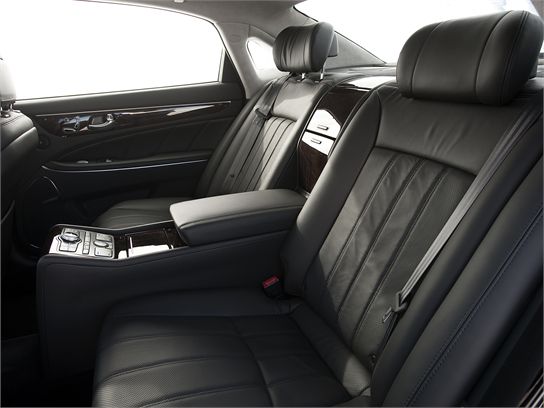
#4. With a few exceptions, controls are logical and intuitive.
Unlike many of the cars it's designed to compete with, the 2011 Hyundai Equus's version of BMW's iDrive and Mercedes-Benz's COMAND system is relatively easy to master quickly. That's due, in part, to Hyundai's wise decision to keep at least some of the primary controls out of the clutches of that console-mounted dial. As a result, drivers can cool the cabin or adjust the fan speed without diving into a technological abyss. The sound system, another feature preyed upon by central-command systems, is largely operated with the dial, though buttons for FM/AM, XM, and DISC/AUX simplify things. Just when we were starting to feel as though we were smarter than the Equus, we found the Climate button, located just below the center screen. Tap it and you'll see a display of current settings on the center screen, suggesting to us that the climate control system was integrated with the central dial. Not so. That screen is for reference only.
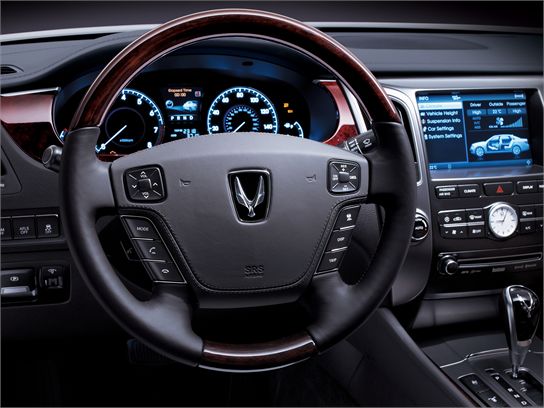
#3. Interior materials are top-notch, for the most part.
Shoppers who have test-driven models from various brands can attest to the fact that interior quality doesn't always reflect price. The Volkswagen Golf, for example, features materials and textures that would rival some luxury cars, though not the 2011 Hyundai Equus. Hyundai's new flagship is dressed to the nines, with Alcantara suede on the headliner and pillars, genuine wood and alloy accents applied throughout the cabin, and leather that's been treated to give it a soft look and feel. Those hides, by the way, are used everywhere, from the door panels and armrests to the seatbacks and dashboard. No pleather here. That upscale treatment continues with the leather-wrapped and wood-trimmed steering wheel, but the front climate control dials could be upgraded with rubber or better plastic.
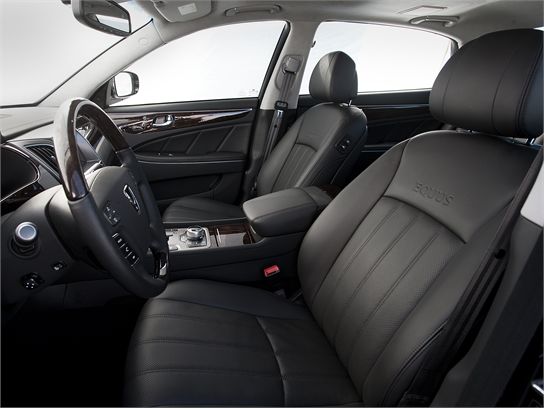
#2. Though the Equus is all-new for 2011, changes and updates are already on the horizon.
As this article is being written, we're still weeks away from the first 2011 Hyundai Equus models arriving on dealers' lots. Nevertheless, Hyundai reps have confirmed that a new 5.0-liter V-8, reportedly rated at 429 horsepower and 376 lb.-ft. of torque, is slated to fill the Equus's engine bay within a few years. The current six-speed gearbox will be replaced by an eight-speed automatic. We're also told that development of a blind-spot warning system, a feature gaining in popularity, wasn't completed in time for the 2011 Equus's debut, but will be available soon. All-wheel-drive and other body styles are expected to debut when the Equus is revamped in five years or so.
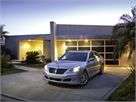
#1. A worthy luxury car from a non-luxury brand. We've heard this story before.
If this whole luxury car from a non-luxury brand scenario sounds vaguely familiar, it should. Not all that long ago, Volkswagen attempted to sell an ultra-luxury sedan designed to take on the best of the automotive world's upper crust. Things didn't go well, and we said farewell to the Phaeton. We're betting the 2011 Hyundai Equus will enjoy a different fate. This new flagship delivers the performance, creature comforts and refinement necessary to compete in the big-ticket sedan class, but more importantly, pricing will likely give the Equus a considerable advantage in terms of value. Like every Hyundai, it's backed by a 10-year/100,000-mile warranty. On top of that, Hyundai has developed a unique sales and service approach for the 2011 Equus, bringing the test drive to you and promising pick up and delivery whenever maintenance is required (for the first five years or 60,000 miles). Despite all this, the Hyundai badge will likely remain a stumbling block. Smart shoppers will look past it.
